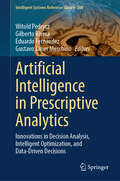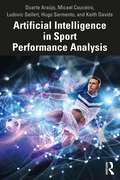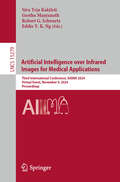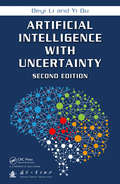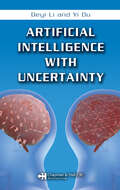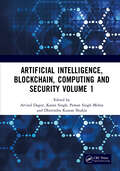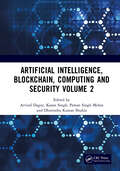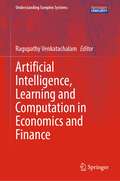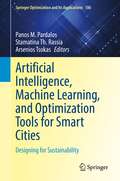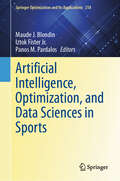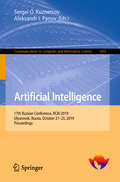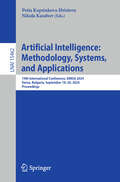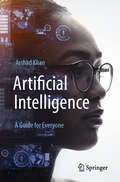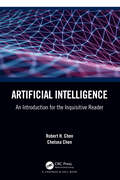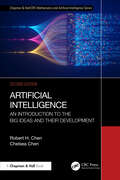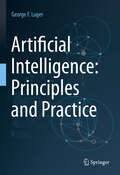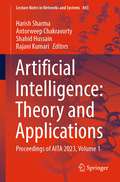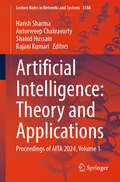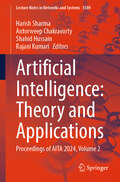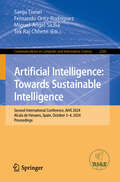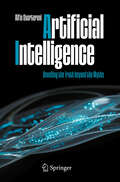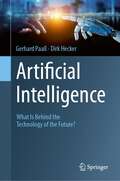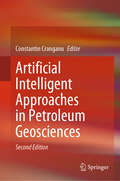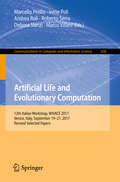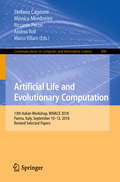- Table View
- List View
Artificial Intelligence in Prescriptive Analytics: Innovations in Decision Analysis, Intelligent Optimization, and Data-Driven Decisions (Intelligent Systems Reference Library #260)
by Witold Pedrycz Eduardo Fernández Gilberto Rivera Gustavo Javier MeschinoConsidering the advances of the different approaches and applications in the last years, and even in the last months, this is a particular moment in history to transform every data-driven decision-making process with the power of Artificial Intelligence (AI). This book reveals, through concrete case studies and original application ideas, how cutting-edge AI techniques are revolutionizing industries such as finance, health care, and manufacturing. It invites us to discover how machine learning, decision analysis, and intelligent optimization are changing, directly or indirectly, almost all aspects of our daily lives. This comprehensive book offers practical insights and real-world applications for professionals, researchers, and students alike. It helps to learn how to apply AI for smarter, data-driven decisions in areas like supply chain management, risk assessment, and even personalized medicine. Be inspired by the chapters of this book and unlock the full potential of AI in your field!
Artificial Intelligence in Sport Performance Analysis
by Keith Davids Duarte Araújo Ludovic Seifert Micael S Couceiro Hugo SarmentoTo understand the dynamic patterns of behaviours and interactions between athletes that characterize successful performance in different sports is an important challenge for all sport practitioners. This book guides the reader in understanding how an ecological dynamics framework for use of artificial intelligence (AI) can be implemented to interpret sport performance and the design of practice contexts. By examining how AI methodologies are utilized in team games, such as football, as well as in individual sports, such as golf and climbing, this book provides a better understanding of the kinematic and physiological indicators that might better capture athletic performance by looking at the current state-of-the-art AI approaches. Artificial Intelligence in Sport Performance Analysis provides an all-encompassing perspective in an innovative approach that signals practical applications for both academics and practitioners in the fields of coaching, sports analysis, and sport science, as well as related subjects such as engineering, computer and data science, and statistics.
Artificial Intelligence over Infrared Images for Medical Applications: Third International Conference, AIIIMA 2024, Virtual Event, November 9, 2024, Proceedings (Lecture Notes in Computer Science #15279)
by Eddie Y. K. Ng Robert G. Schwartz Geetha Manjunath Siva Teja KakiletiThis book constitutes the refereed proceedings of the Third International Conference on Artificial Intelligence over Infrared Images for Medical Applications, AIIIMA 2024, held as a virtual event, on November 9, 2024. The 11 full papers presented in these proceedings were carefully reviewed and selected from 27 submissions. These papers focus on the application of Artificial Intelligence in medical infrared imaging for cancer screening, cancer diagnosis, cancer risk assessment, treatment monitoring, sports injury, diabetic foot ulcers detection, and pain management.
Artificial Intelligence with Uncertainty
by Yi Du Deyi LiThis book develops a framework that shows how uncertainty in Artificial Intelligence (AI) expands and generalizes traditional AI. It explores the uncertainties of knowledge and intelligence. The authors focus on the importance of natural language – the carrier of knowledge and intelligence, and introduce efficient physical methods for data mining amd control. In this new edition, we have more in-depth description of the models and methods, of which the mathematical properties are proved strictly which make these theories and methods more complete. The authors also highlight their latest research results.
Artificial Intelligence with Uncertainty
by Deyi Li Yi DuThe information deluge currently assaulting us in the 21st century is having a profound impact on our lifestyles and how we work. We must constantly separate trustworthy and required information from the massive amount of data we encounter each day. Through mathematical theories, models, and experimental computations, Artificial Intelligence with U
Artificial Intelligence, Blockchain, Computing and Security Volume 1: Proceedings of the International Conference on Artificial Intelligence, Blockchain, Computing and Security (ICABCS 2023), Gr. Noida, UP, India, 24 - 25 February 2023
by Karan Singh Pawan Singh Mehra Arvind Dagur Dhirendra Kumar ShuklaThis book contains the conference proceedings of ICABCS 2023, a non-profit conference with the objective to provide a platform that allows academicians, researchers, scholars and students from various institutions, universities and industries in India and abroad to exchange their research and innovative ideas in the field of Artificial Intelligence, Blockchain, Computing and Security. It explores the recent advancement in field of Artificial Intelligence, Blockchain, Communication and Security in this digital era for novice to profound knowledge about cutting edges in artificial intelligence, financial, secure transaction, monitoring, real time assistance and security for advanced stage learners/ researchers/ academicians. The key features of this book are: Broad knowledge and research trends in artificial intelligence and blockchain with security and their role in smart living assistance Depiction of system model and architecture for clear picture of AI in real life Discussion on the role of Artificial Intelligence and Blockchain in various real-life problems across sectors including banking, healthcare, navigation, communication, security Explanation of the challenges and opportunities in AI and Blockchain based healthcare, education, banking, and related industries This book will be of great interest to researchers, academicians, undergraduate students, postgraduate students, research scholars, industry professionals, technologists, and entrepreneurs.
Artificial Intelligence, Blockchain, Computing and Security Volume 2: Proceedings of the International Conference on Artificial Intelligence, Blockchain, Computing and Security (ICABCS 2023), Gr. Noida, UP, India, 24 - 25 February 2023
by Karan Singh Pawan Singh Mehra Arvind Dagur Dhirendra Kumar ShuklaThis book contains the conference proceedings of ICABCS 2023, a non-profit conference with the objective to provide a platform that allows academicians, researchers, scholars and students from various institutions, universities and industries in India and abroad to exchange their research and innovative ideas in the field of Artificial Intelligence, Blockchain, Computing and Security. It explores the recent advancement in field of Artificial Intelligence, Blockchain, Communication and Security in this digital era for novice to profound knowledge about cutting edges in artificial intelligence, financial, secure transaction, monitoring, real time assistance and security for advanced stage learners/ researchers/ academicians. The key features of this book are: Broad knowledge and research trends in artificial intelligence and blockchain with security and their role in smart living assistance Depiction of system model and architecture for clear picture of AI in real life Discussion on the role of Artificial Intelligence and Blockchain in various real-life problems across sectors including banking, healthcare, navigation, communication, security Explanation of the challenges and opportunities in AI and Blockchain based healthcare, education, banking, and related industries This book will be of great interest to researchers, academicians, undergraduate students, postgraduate students, research scholars, industry professionals, technologists, and entrepreneurs.
Artificial Intelligence, Learning and Computation in Economics and Finance (Understanding Complex Systems)
by Ragupathy VenkatachalamThis book presents frontier research on the use of computational methods to model complex interactions in economics and finance. Artificial Intelligence, Machine Learning and simulations offer effective means of analyzing and learning from large as well as new types of data. These computational tools have permeated various subfields of economics, finance, and also across different schools of economic thought. Through 16 chapters written by pioneers in economics, finance, computer science, psychology, complexity and statistics/econometrics, the book introduces their original research and presents the findings they have yielded.Theoretical and empirical studies featured in this book draw on a variety of approaches such as agent-based modeling, numerical simulations, computable economics, as well as employing tools from artificial intelligence and machine learning algorithms. The use of computational approaches to perform counterfactual thought experiments are also introduced, which help transcend the limits posed by traditional mathematical and statistical tools.The book also includes discussions on methodology, epistemology, history and issues concerning prediction, validation, and inference, all of which have become pertinent with the increasing use of computational approaches in economic analysis.
Artificial Intelligence, Machine Learning, and Optimization Tools for Smart Cities: Designing for Sustainability (Springer Optimization and Its Applications #186)
by Panos M. Pardalos Stamatina Th. Rassia Arsenios TsokasThis volume offers a wealth of interdisciplinary approaches to artificial intelligence, machine learning and optimization tools, which contribute to the optimization of urban features towards forming smart, sustainable, and livable future cities.Special features include:New research on the design of city elements and smart systems with respect to new technologies and scientific thinkingDiscussions on the theoretical background that lead to smart cities for the futureNew technologies and principles of research that can promote ideas of artificial intelligence and machine learning in optimized urban environmentsThe book engages students and researchers in the subjects of artificial intelligence, machine learning, and optimization tools in smart sustainable cities as eminent international experts contribute their research results and thinking in its chapters. Overall, its audience can benefit from a variety of disciplines including, architecture, engineering, physics, mathematics, computer science, and related fields.
Artificial Intelligence, Optimization, and Data Sciences in Sports (Springer Optimization and Its Applications #218)
by Panos M. Pardalos Iztok Fister Jr. Maude J. BlondinThis book delves into the dynamic intersection of data science, data mining, machine learning, and optimization within sports. It compiles and presents the latest achievements in this vibrant and emerging research area, offering a comprehensive overview of how these technologies revolutionize sports analytics and performance. Topical coverage includes artificial intelligence in sports, automated machine learning for training sessions, computational social science, and deep learning applications. Readers will also explore cutting-edge concepts such as digital twins in sports and sports prediction through data analysis. This volume highlights theoretical advancements and practical case studies that demonstrate real-world applications. Ideal for researchers, practitioners, and students in fields related to sports science, data analytics, and machine learning, this book serves as a crucial resource for anyone looking to understand the transformative impact of technology on sports. Whether you are an academic scholar or a professional working in the industry, this collection offers valuable insights that bridge the gap between research and practical solutions.
Artificial Intelligence: 17th Russian Conference, RCAI 2019, Ulyanovsk, Russia, October 21–25, 2019, Proceedings (Communications in Computer and Information Science #1093)
by Sergei O. Kuznetsov Aleksandr I. PanovThis book constitutes the proceedings of the 17th Russian Conference on Artificial Intelligence, RCAI 2019, held in Ulyanovsk, Russia, in October 2019. The 23 full papers presented along with 7 short papers in this volume were carefully reviewed and selected from 130 submissions. The conference deals with a wide range of topics, including multi-agent systems, intelligent robots and behaviour planning; automated reasoning and data mining; natural language processing and understanding of texts; fuzzy models and soft computing; intelligent systems and applications.
Artificial Intelligence: 19th International Conference, AIMSA 2024, Varna, Bulgaria, September 18–20, 2024, Proceedings (Lecture Notes in Computer Science #15462)
by Petia Koprinkova-Hristova Nikola KasabovThis book constitutes the refereed proceedings of the 19th International Conference on Artificial Intelligence: Methodology, Systems, and Applications, AIMSA 2024, held in Varna, Bulgaria, during September 18–20, 2024. The 18 revised full papers presented in this book were carefully reviewed and selected from 23 submissions. They cover a wide range of topics in AI and its applications: natural language processing, sentiment analyses, image processing, optimization, reinforcement learning, from deep ANNs to spike timing NNs, applications in economics, medicine and process control.
Artificial Intelligence: A Guide for Everyone
by Arshad KhanEnterprises, as well as individuals, are racing to reap the benefits of AI. However, in most cases, they are doing so without understanding the technology or its implications and risks, which can be significant. Artificial Intelligence: A Guide for Everyone is a step in addressing that gap by providing information that readers can easily understand at every level. This book aims to provide useful information to those planning, developing, or using AI, which has the potential to transform industries and shape the future. Whether you are stepping into the world of AI for the first time or are a seasoned professional seeking deeper insights, this comprehensive guide ensures that both beginners and experienced individuals find value within its pages. Artificial Intelligence: A Guide for Everyone encompasses theoretical as well as practical aspects of AI across various industries and applications. It demystifies AI by explaining, in a language that non-techies can follow, its history, different types, differentiating technologies, and various aspects of implementation. It explains the connection between AI theory and real-world application across diverse industries and how it fuels innovation. Whether you are an executive, student, professional, seasoned businessperson, or simply curious about the future of technology, Artificial Intelligence: A Guide for Everyone equips you with the knowledge to navigate this transformative field with confidence.
Artificial Intelligence: An Introduction for the Inquisitive Reader
by Robert H. Chen Chelsea C. ChenArtificial Intelligence: An Introduction for the Inquisitive Reader guides readers through the history and development of AI, from its early mathematical beginnings through to the exciting possibilities of its potential future applications. To make this journey as accessible as possible, the authors build their narrative around accounts of some of the more popular and well-known demonstrations of artificial intelligence including Deep Blue, AlphaGo and even Texas Hold’em, followed by their historical background, so that AI can be seen as a natural development of mathematics and computer science. As the book moves forward, more technical descriptions are presented at a pace that should be suitable for all levels of readers, gradually building a broad and reasonably deep understanding and appreciation for the basic mathematics, physics, and computer science that is rapidly developing artificial intelligence as it is today. Features Only mathematical prerequisite is an elementary knowledge of calculus Accessible to anyone with an interest in AI and its mathematics and computer science Suitable as a supplementary reading for a course in AI or the History of Mathematics and Computer Science in regard to artificial intelligence.
Artificial Intelligence: An Introduction to the Big Ideas and their Development (Chapman & Hall/CRC Mathematics and Artificial Intelligence Series)
by Robert H. Chen Chelsea ChenArtificial Intelligence: An Introduction to Big Ideas and their Development, Second Edition guides readers through the history and development of artificial intelligence (AI), from its early mathematical beginnings through to the exciting possibilities of its potential future applications. To make this journey as accessible as possible, the authors build their narrative around accounts of some of the more popular and well-known demonstrations of artificial intelligence, including Deep Blue, AlphaGo and even Texas Hold’em, followed by their historical background, so that AI can be seen as a natural development of the mathematics and computer science of AI. As the book proceeds, more technical descriptions are presented at a pace that should be suitable for all levels of readers, gradually building a broad and reasonably deep understanding and appreciation for the basic mathematics, physics, and computer science that is rapidly developing artificial intelligence as it is today. Features Only mathematical prerequisite is an elementary knowledge of calculus. Accessible to anyone with an interest in AI and its mathematics and computer science. Suitable as a supplementary reading for a course in AI or the History of Mathematics and Computer Science in regard to artificial intelligence. New to the Second Edition Fully revised and corrected throughout to bring the material up-to-date. Greater technical detail and exploration of basic mathematical concepts, while retaining the simplicity of explanation of the first edition. Entirely new chapters on large language models (LLMs), ChatGPT, and quantum computing.
Artificial Intelligence: Principles and Practice
by George F. LugerThis book provides a complete introduction to Artificial Intelligence, covering foundational computational technologies, mathematical principles, philosophical considerations, and engineering disciplines essential for understanding AI. Artificial Intelligence: Principles and Practice emphasizes the interdisciplinary nature of AI, integrating insights from psychology, mathematics, neuroscience, and more. The book addresses limitations, ethical issues, and the future promise of AI, emphasizing the importance of ethical considerations in integrating AI into modern society. With a modular design, it offers flexibility for instructors and students to focus on specific components of AI, while also providing a holistic view of the field. Taking a comprehensive but concise perspective on the major elements of the field; from historical background to design practices, ethical issues and more, Artificial Intelligence: Principles and Practice provides the foundations needed for undergraduate or graduate-level courses. The important design paradigms and approaches to AI are explained in a clear, easy-to-understand manner so that readers will be able to master the algorithms, processes, and methods described. The principal intellectual and ethical foundations for creating artificially intelligent artifacts are presented in Parts I and VIII. Part I offers the philosophical, mathematical, and engineering basis for our current AI practice. Part VIII presents ethical concerns for the development and use of AI. Part VIII also discusses fundamental limiting factors in the development of AI technology as well as hints at AI's promising future. We recommended that PART I be used to introduce the AI discipline and that Part VIII be discussed after the AI practice materials. Parts II through VII present the three main paradigms of current AI practice: the symbol-based, the neural network or connectionist, and the probabilistic. Generous use of examples throughout helps illustrate the concepts, and separate end-of-chapter exercises are included. Teaching resources include a solutions manual for the exercises, PowerPoint presentation, and implementations for the algorithms in the book.
Artificial Intelligence: Proceedings of AITA 2023, Volume 1 (Lecture Notes in Networks and Systems #843)
by Shahid Hussain Harish Sharma Antorweep Chakravorty Rajani KumariThis book features a collection of high-quality research papers presented at International Conference on Artificial Intelligence: Theory and Applications (AITA 2023), held during 11–12 August 2023 in Bengaluru, India. The book is divided into two volumes and presents original research and review papers related to artificial intelligence and its applications in various domains including health care, finance, transportation, education, and many more.
Artificial Intelligence: Proceedings of AITA 2024, Volume 1 (Lecture Notes in Networks and Systems #5588)
by Shahid Hussain Harish Sharma Antorweep Chakravorty Rajani KumariThis book features a collection of high-quality research papers presented at International Conference on Artificial Intelligence: Theory and Applications (AITA 2024), held during 9–10 August 2024 in Bengaluru, India. The book is divided into two volumes and presents original research and review papers related to artificial intelligence and its applications in various domains including health care, finance, transportation, education, and many more.
Artificial Intelligence: Proceedings of AITA 2024, Volume 2 (Lecture Notes in Networks and Systems #5589)
by Shahid Hussain Harish Sharma Antorweep Chakravorty Rajani KumariThis book features a collection of high-quality research papers presented at International Conference on Artificial Intelligence: Theory and Applications (AITA 2024), held during 9–10 August 2024 in Bengaluru, India. The book is divided into two volumes and presents original research and review papers related to artificial intelligence and its applications in various domains including health care, finance, transportation, education, and many more.
Artificial Intelligence: Second International Conference, AI4S 2024, Alcala de Henares, Spain, October 3–4, 2024, Proceedings (Communications in Computer and Information Science #2243)
by Miguel-Angel Sicilia Sanju Tiwari Fernando Ortiz-Rodriguez Tek Raj ChhetriThis book constitutes the proceedings of the Second International Conference on Artificial Intelligence: Towards Sustainable Intelligence, AI4S 2024, held in Alcala de Henares, Spain, during October 3-4, 2024. The 16 full papers and 2 short papers included in this book were carefully reviewed and selected from 59 submissions. They deal with trustworthy AI and related topics, focusing on software and its engineering; software development process management and methods, etc.
Artificial Intelligence: Unveiling the Truth beyond the Myths (Copernicus Books)
by Alfio QuarteroniArtificial intelligence (AI) is transforming multiple aspects of human life, raising fundamental questions: Is AI truly intelligent? Can it surpass human capabilities? What are its risks and opportunities? In this book, I aim to clarify what AI really is, debunking myths while offering a rigorous, balanced perspective on its impact. Rather than chasing the latest AI trends, I will focus on the core principles that define it, tracing its evolution from early pioneers like Alan Turing to today&’s advanced systems. AI remains in the realm of narrow intelligence, excelling at specific tasks but far from replicating human cognition. Yet, its ability to process vast data, predict behaviors, and generate creative content is reshaping industries, from healthcare to finance. At the heart of AI&’s progress is machine learning, particularly neural networks, which rely more on data-driven training than traditional scientific theory. However, this innovation comes with challenges: environmental costs, job market disruptions, ethical dilemmas, and the black box problem—AI&’s decision-making opacity, which raises concerns about trust and accountability. AI also plays a growing role in global power dynamics, influencing governance, security, and even democracy. Nations leading AI development gain strategic advantages, but without careful regulation, AI could fuel inequality, surveillance, and manipulation. Despite the fears AI evokes, it is neither an existential threat nor a magical solution. My goal is not to celebrate or demonize it but to provide a critical framework for understanding this technological revolution. By fostering awareness, we can shape AI&’s integration into society in a way that aligns with human values and scientific progress.
Artificial Intelligence: What Is Behind the Technology of the Future?
by Gerhard Paaß Dirk HeckerArtificial Intelligence (AI) is already present in our daily routines, and in the future, we will encounter it in almost every aspect of life – from analyzing X-rays for medical diagnosis, driving autonomous cars, maintaining complex machinery, to drafting essays on environmental problems and drawing imaginative pictures. The potentials of AI are enormous, while at the same time many myths, uncertainties and challenges circulate that need to be tackled. The English translation of the book “Künstliche Intelligenz – Was steckt hinter der Technologie der Zukunft?” originally published in German (Springer Vieweg, 2020), this book is addressed to the general public, from interested citizens to corporate executives who want to develop a better and deeper understanding of AI technologies and assess their consequences. Mathematical basics, terminology, and methods are explained in understandable language. Adaptations to different media such as images, text, and speech and the corresponding generative models are introduced. A concluding discussion of opportunities and challenges helps readers evaluate new developments, demystify them, and assess their relevance for the future.
Artificial Intelligent Approaches in Petroleum Geosciences
by Constantin CranganuThis book presents cutting-edge approaches to solving practical problems faced by professionals in the petroleum industry and geosciences. With various state-of-the-art working examples from experienced academics, the book offers an exposure to the latest developments in intelligent methods for oil and gas research, exploration, and production. This second edition is updated with new chapters on machine learning approaches, data-driven modelling techniques, and neural networks. The book delves into machine learning approaches, including evolutionary algorithms, swarm intelligence, fuzzy logic, deep artificial neural networks, KNN, decision tree, random forest, XGBoost, and LightGBM. it also analyzes the strengths and weaknesses of each method and emphasizes essential parameters like robustness, accuracy, speed of convergence, computer time, overlearning, and normalization. Integration, data handling, risk management, and uncertainty management are all crucial issues in petroleum geosciences. The complexities of these problems require a multidisciplinary approach that fuses petroleum engineering, geology, geophysics, and geochemistry. Essentially, this book presents an approach for integrating various disciplines such as data fusion, risk reduction, and uncertainty management. Whether you are a professional or a student, you can greatly benefit from the latest advancements in intelligent methods applied to oil and gas research. This comprehensive and updated book presents cutting-edge approaches and real-world examples that can help you in solving the intricate challenges of the petroleum industry and geosciences.
Artificial Life and Evolutionary Computation: 12th Italian Workshop, WIVACE 2017, Venice, Italy, September 19-21, 2017, Revised Selected Papers (Communications In Computer And Information Science #830)
by Irene Poli Marcello Pelillo Marco Villani Roberto Serra Andrea Roli Debora SlanziThis book constitutes the revised selected papers of the 12th Italian Workshop on Advances in Artificial Life, Evolutionary Computation, WIVACE 2017, held in Venice, Italy, in September 2017.The 23 full papers presented were thoroughly reviewed and selected from 33 submissions. They cover the following topics: physical-chemical phenomena; biological systems; economy and society; complexity; optimization.
Artificial Life and Evolutionary Computation: 13th Italian Workshop, WIVACE 2018, Parma, Italy, September 10–12, 2018, Revised Selected Papers (Communications in Computer and Information Science #900)
by Stefano Cagnoni Marco Villani Andrea Roli Monica Mordonini Riccardo PecoriThis book constitutes the revised selected papers of the 13th Italian Workshop on Artificial Life and Evolutionary Computation, WIVACE 2018, held in Parma, Italy, in September 2018. The 12 full papers presented were thoroughly reviewed and selected from 30 submissions. They cover the following topics: Boolean networks and complex systems; economic, societal and technological applications; chemical, biological and medical applications. The chapter “Unveiling Latent Relations in the Photonics Techno-Economic Complex System” is open access under a CC BY 4.0 license at link.springer.com.
